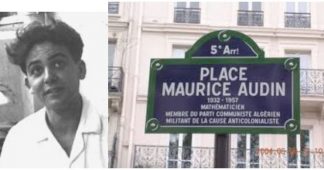The French law dated 7 Thermidor Year II (25 July 1794) stipulates that every citizen should be able to be informed of whatever had been done in their name. This was the origin of the public service of the National Archives of France, a body created four years earlier by the Constituent Assembly. But while this principle of transparency was thus officially enacted, the raison d’Etat did not easily accommodate it. The disappearance of Maurice Audin, an activist in the cause of Algerian independence and the bloody repression in and around Paris of the 17 October 1961 protest called by the National Liberation Front are two emblematic instances of information retention on the quiet.
Par Sylvie Braibant, Pierre Audin
Translations:français /Español
Translated from French by Noël Burch.
photo: On a wall in Algiers, 2003.
Maurice Audin, lithography from Ernest Pignon-Ernest
In 2013, François Hollande gave Josette Audin copies of documents concerning her husband Maurice Audin1, along with a list of archives she would be allowed to consult and copy. Among other documents, she had access to a file seized in the home of Colonel Yves Godard, at the time a fugitive from justice. Godard was one of the heads of the Organisation armée secrète (OAS), a terrorist organisation fighting to keep Algeria French.
Actually, there was nothing extraordinary about the President’s decision; French law makes it possible to stamp documents “confidential”, “secret” or “very secret” in order to prevent their consultation, but only for a period of 50 years.
What does the Godard file, added to the National Archives in 1961, contain? Among other things, the official explanation of Maurice Audin’s disappearance (his alleged escape from prison), documents forged by the army to back up this thesis, with its contradictions. Each document is presented by Godard in his own way since it is likely he himself fabricated this file to cover his tracks and possibly to be used against other officers. This is what can be read in Godard’s archives in California, unearthed in 2011 by Nathalie Funès, journalist at L’Obs. In an unfinished draft book, he attacks Jacques Massu, the General in charge of the Battle of Algiers who had refused to join the OAS. He accuses Gérard Garcet, who was close to Massu, of having executed Maurice Audin, an accusation which does not appear in the file preserved in the National Archives.
Garcet, of course, denied Godard’s assertion: as both were involved in the repression of the Algerians, they both made laying one of their professional “virtues”. Their statements would need to be checked against other sources.
There’s nothing quite like a criminal investigation and the contradictory archives dealing with Maurice Audin were first assembled in view of an investigation of this sort, then on the basis of Josette Audin’s complaint lodged for intentional homicide. The investigation was carried out in complex circumstances. Interrupted by reason of the amnesty legislation, it nonetheless produced written testimony preserved in the provincial archives of the tribunal involved but not in the National Archives.
Private or public documents?
The archives are of different types and are to be found in different locations. Thus, the newspapers of the period are at the Bibliothèque Nationale and historians and journalists can access them immediately. But the French administration generates a huge quantity of paperwork, part of which winds up in the Archives. The Army is no exception. General Pierre Aussaresses liked to say he kept a manifold notebook with numbered pages each of which was in triplicate; day after day, he recorded the detail of his activities, keeping one copy and distributing the others to different recipients, among them Massu. It would be astonishing if these were not filed in some archive. But where to find them? In Aussaresses’ archives or Massu’s? There is no way of knowing what they contain, because these remain private, which in itself is a scandal: these are professional, not private documents, and should be part of the public heritage, as was proposed by a report commissioned by the Juppe government in 1996:
“Archives produced by political authorities (President of the Republic, Cabinet ministers and secretaries or members of local executives) and their cabinets in the performance of their public duties, are of a public nature, as are those of officials of the administration, the army and the diplomatic corps.”
If Ausseresses was speaking the truth, there still exist two copies of those registers. It remains to be seen whether they were stamped “secret” or not. If those papers were not destroyed, they contain precise elements concerning the detainees and the decisions taken concerning them: General Aussaresses claimed that every morning he and Massu decided the fate of each one, and that this was written down in his “manifold”.
Maurice Audin and the “raison d’Etat”
Thus, in the case of Maurice Audin, consulting the National Archives is not very fruitful. In the presidential archives from General de Gaulle’s term of office, there is a four-page note dated 4 August 1960, and in fact several successive versions of that note, no doubt written at the General’s request, and dealing with the Audin affair about which there was apparently too much fuss being made to his liking.
One need only read pages 3 and 4 of that notes to understand about reason of state. The alternative is explained quite clearly to the President: either punish the men guilty of Audin’s murder or drag out the investigation indefinitely so as not to shift the government’s responsibility onto the army :
“Hence it is reasonable to predict that if the present slant given the investigation is maintained, the Audin affair will take on a new dimension considering the importance of the political and military figures whose names will be implicated.[…]
The advisability of such an eventuality should be appreciated in the light of two types of considerations.
1°) in favour of a broadening of the investigation and a referral of the case to a court of law, the following arguments may be invoked:
➞ the moral obligation of the governmental authorities, who can have no doubt that Audin was murdered, to discover the culprits and punish them;
➞ the intense emotion which cannot fail to be aroused in many sectors of public opinion should the exact circumstances of Audin’s death remain unknown and the crime unpunished;
➞ the fear (…) that dismissal of the case by an examining magistrate would be attributed to pressure from the power structure.
2°) the notion that the Audin affair, contrary to what certain circles are desperate to demonstrate, is not a test case and that the investigation should be slowed down could be justified, on the other hand, by the following considerations:
➞ the Audin case took place during the “battle of Algiers,” in other words, during a period of extreme tension; it’s not fair to make a few officers bear the burden of actions which were fully known to and tolerated by governmental authorities, who considered it was easier to resort to extra-legal practices than to adapt legality to the circumstances;
➞ Audin was a member of the Algerian communist party and was guilty of deeds which certainly did not deserve the death penalty but which nonetheless constituted acts of collusion with the uprising;
➞ the excesses of the “Audin Committee,” its exploitation of the young academic’s disappearance in their campaign against the government’s policy in Algeria and their efforts to discredit the army’s action made military circles especially touchy about this affair.”
No need to consult the archives to know which option was chosen: the investigation was “slowed down”.
An unkept Presidential promise
On 13 September 2018, President Emmanuel Macron went to the home of Josette Audin to place in her hands an official declaration, published on the website of the Elysée Palace. In it is described the system known as “arrestation-détention” (arrest-detention) introduced during the war in Algeria: arbitrary arrest, torture, summary execution. It is acknowledged that Maurice Audin was a victim of this system like many other persons, though it does not say whether he died under torture or was executed afterwards. It announces the imminent opening of all the archives dealing with those he went missing during the war in Algeria. And it even specifies that this concerns all those missing, whether civilians or military personnel, French or Algerian. The amount of work in store for archivists would be colossal: earmarking the relevant archives and making them available to the general public.
A year later, on 20 September 2019, on the occasion of a workshop held at the Assemblée Nationale on the theme of “Persons missing during the Algerian war as a result of actions by the French army,” Jean-Charles Bedague, of the Inter-Ministerial Service of the French Archives announced the “forthcoming” implementation of the President’s declarations. A few days earlier, a decree had been published, but it did not yet deal with the Maurice Audin case. It was just a matter of time he assured his listeners, a website for archive research had been posted, it would soon be stocked with data.
But since December 2019, it must be recognized that the opposite is true. The General Secretariat for Defense and National Security (SGDSN) thumbed its nose at the President’s declarations and tightened the screws by reactivating article 63 of the General Inter-ministerial Instructions (IGI 1300) adopted in 2011, a text never put up for discussion, yet which takes precedence over a law discussed in parliament in 2008 and which stipulated that “documents in public archives are as a matter of principle freely available to anyone who should request them.” And it is not the new version of the IG1300, published in the Journal officiel of 15 November, that will change the situation.
Two archivists side-lined
As a result, the archives have been sealed up again, since intimidation is used against any attempt to reveal them: thus, disclosers and archivists are under threat of various punishments, all liable to be accused of compromising security. In 2020, in order to tighten its grip, the SGDSN has demanded that confidential, secret and ‘very secret’ documents be declassified page by page before consultation. A titanic task which discourages any attempt to open these archives. And this could even concern documents that have already been consulted or even published. And it is what justifies the legal proceedings taken against this IGI-1300 which is totally illegal: the op-eds, petitions, appeals to the Conseil d’état by associations, by historians, archivists and by the « Collectif secret défense, un enjeu démocratique ».
With the events of 17 October 1961, the War in Algeria made a brutal incursion onto French soil. On that day, in Paris, at the call of the National Liberation Front (Front de libération nationale, FLN), Algerians from the working-class suburbs marched peacefully into the capital in protest against the repression that targeted them. The march turned into a bloodbath at the orders of police prefect Maurice Papon, the same man who had carried out—and even anticipated—the orders to round up the Jews of Bordeaux after the Germans invaded the “free zone” in 1942.
For many decades, the archives of that massacre were locked away. Historian Jean-Luc Einaudi, prevented from consulting them on the pretext he was not an academic, managed nonetheless to gather enough extra-institutional data to publish La Bataille de Paris (Seuil, 1991). In 1999, following his trial for his role in the collaboration with the Germans and the deportation of the Jews, Maurice Papon brought a slander suit against Jean-Luc Einaudi. At this point two whistle-blowers came into the picture, Brigitte Lainé and Philippe Grand bringing to light proof of the killings. She was chief curator of the Archives de France. In the Paris Archives, she and her friend Philippe Grand were in charge of the judicial archives and they studied those covering the period from September to December 1961. In February 999 they testified in favour of Jean-Luc Einaudi and against the duty of confidentiality which was demanded of him: “Starting in the month of September, there is a permanent feature in the staging of death; a majority of the drowning victims found in the Seine and the canals of Paris had their hands tied behind their backs or bore traces of strangulation or bullet wounds.”
Maurice Papon’s suit against Jean-Luc Einaudi was dismissed, but neither of the archivists and not archive access survived this ordeal unscathed. Brigitte Lainé and Philippe Grand were persecuted by their superiors, demoted, sidelined, forbidden any contact with the public, their dossiers confiscated. They were shunned by a number of their colleagues, prompt to denounce them by petitioning Catherine Trautman, minister of culture in Lionel Jospin’s cabinet (1997–2002).
In March 2003, the Administrative Tribunal of Paris recognized the existence of disguised disciplinary sanctions taken against Brigitte Lainé and Philippe Grand and rendered nul and void the relevant memoranda. A ruling of no effect.
In March 2004, the same tribunal ordered the Mayor of Paris to execute its ruling. Again, to no avail. One after the other, the two archivists retired, surrounded by indifference and opprobrium for having violated the ‘secrecy’ of the Algerian war archives. Brigitte Lainé died on 2 November 2018 without ever having been rehabilitated.
Other blind spots in recent history
The war in Algeria is not the only dead angle in the French archives. Those concerning WW2, especially collaboration with the Germans, were inaccessible for many years, until the law of 2006. The history of that shameful period was written outside of France, in the United States, the United Kingdom or Germany. Today these gaps have been filled.
But those associated with colonisation and decolonisation or“ Françafrique” and its post-colonial networks of corruption remain ultra-sensitive. Besides the disappearance of Maurice Audin and the massacre of October 1961, half of the sixteen cases assembled by the Collectif secret défense, un enjeu démocratique are related in one way or another with the ex-colonies: the 1945 massacre of Senegalese riflemen at Thiaroye in Senegal; the May 1945 massacres in Sétif, Guelma and Kherata; the kidnapping and murder of Mehdi Ben Barka on 19 October 1965 in Paris; the murder of Henri Curiel on 4 May 1978 in Paris; the disappearance of Judge Bernard Borrel on 18 0ctober 1995 in Djibouti; the role of France in the genocide of the Tutsis in Rwanda in the Spring of 1994; or the murder of two reporters, Ghislaine Dupont and Claude Verlon in Mali, on 2 November 2013.
For all these “dossiers,” historians, families, magistrates, and archivists committed to a quest for truth, come up against military secrecy, in spite of theoretically shortened time limits, and against the thousand and one way of denying or hampering the communication of documents: “redacted” archives, in which whole sections are covered in thick black ink so as to be illegible; arbitrarily variable time limits for consultation; incorrect class marks; dispersal among various administrations; or even outright flouting of an official request. In 1981, a member of Gaston Deferre’s cabinet at the Ministry of Interior Affairs asked the Service de Documentation Extérieure et de Contre-Espionnage (SDECE) to show him the dossier on Henri Curiel. At his first appointment, he was handed a slender file of three pages, each containing only a few lines. He complained. At his second appointment, he was shown into a room chock-full of unlabelled, unclassified files, a hopelessly impracticable forest.
Yet occasionally in this area the judicial system will vindicate the most determined petitioners. On 12 June 2020, the Conseil d’État upheld François Granier’s request to consult President François Mitterand’s archives from his term of office deposited at the National Archives, especially for the spring of 1994 when the genocide of the Rwanda Tutsis was perpetrated by the ruling Hutus. The administration had systematically rejected the scholar’s requests. But for the very first time, the high court of administrative justice ruled that “the protection of state secrets must be weighed against the need to inform the public of historic events.” And that, in the present case, the need to inform was more important than the secrecy. A decision which sets a judicial precedent and might pave the way for France to follow the example set by other democracies. As in the United States, where the time limit for access to federal government records is ten years. It may even be further reduced if it is deemed that transparency is more important for democracy than secrecy. This explains why, in order to understand the ins and outs of the disappearance of their husband and father, Maurice Audin’s family had to travel to the United States.
Published at orientxxi.info











